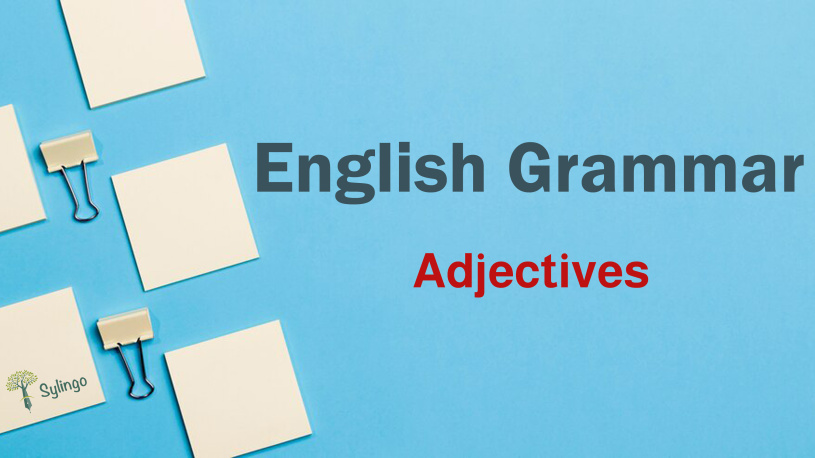We use adjectives to describe nouns or pronouns and give more information about them. In this lesson, we will explain how to form adjectives.
Adjectives features
1- Adjectives come in different places in a sentence. They can come before or after the described noun.
2- Adjectives can come before a singular or plural noun. They always come in the singular, even if the described noun is plural.
3- Several suffixes end with adjectives, as there is no general rule for forming adjectives.
4- We do not use articles before adjectives unless the adjective and the described noun come together.
5- Adjectives can describe size, shape, age, color, origin, material, or benefit. When more than one adjective is mentioned, there is adjectives order to use.
Types of adjectives
1- Descriptive adjectives, which are the most common and used. We will learn about them in this lesson.
2- Demonstrative adjectives (this - that - these - those).
3- Possessive adjectives (my - your - his - her - its - our - their).
4- Comparative adjectives.
5- Superlative adjectives.
Adjectives placed in a sentence
They can come in different places in a sentence.
1- Before the described noun.
Example: The tall man.
2- After the described noun directly.
Example: Someone weird.
3- After the verb Be.
Example: He is handsome.
4- After linking verbs.
Examples:
|
The food smells delicious. |
|
You look beautiful. |
|
I remain calm. |
|
He becomes tired. |
Adjectives forming
We can form adjectives by adding a suffix or prefix to the word, as each group of words has its own rule.
1- The suffix ing:
We form it by adding (ing) to the end of the infinitive form of a verb.
Examples:
|
Verb |
Adjective |
|
Bore |
Boring |
|
Excite |
Exciting |
|
Annoy |
Annoying |
|
Satisfy |
Satisfying |
2- The suffix ed:
We form it by adding (ed) to the end of the infinitive form of a verb.
Examples:
|
Verb |
Adjective |
|
Bore |
Bored |
|
Worry |
Worried |
|
Terrify |
Terrified |
|
Delight |
Delighted |
3- The suffixes less and ful:
These suffixes change the meaning of a word when they are added to the end of the word. The suffix ful means (with), and the suffix less means (without).
Examples:
|
Less |
Ful |
|
Careless |
Careful |
|
Helpless |
Helpful |
4- More suffixes:
Examples:
|
Adjective |
Suffix/prefix |
|
Creative |
-ive |
|
Attractive |
|
|
Asleep |
a- |
|
Awake |
|
|
Central |
-al |
|
Professional |
|
|
Different |
-ent |
|
Dependent |
|
|
Famous |
-ous |
|
Dangerous |
|
|
Avoidable |
-able |
|
Drinkable |
|
|
Invisible |
-ible |
|
Industrial |
-ial |
|
Economic |
-ic |
|
Angry |
-y |
|
Wealthy |
|
|
Selfish |
-ish |
5- Adjectives derived from countries or continents:
Examples:
|
Noun |
Adjective |
|
France |
French |
|
Egypt |
Egyptian |
|
Ireland |
Irish |
|
Africa |
African |
6- We can use some prefixes before an adjective to give the meaning of negation.
Examples:
|
Prefix |
Adjective |
|
un- |
Uncomfortable |
|
in- |
Incomplete |
|
ir- |
Irregular |
|
im- |
Impatient |
|
il- |
Illegal |
|
non- |
Non-neutral |
|
dis- |
Dishonest |
7- Adjectives that do not have a specific rule and we do not add a prefix or suffix to them.
Examples:
|
New |
|
Green |
|
Cold |
|
Sad |
Adjectives order
In case there is more than one adjective describing a particular noun in a sentence, we place these adjectives starting with:
1- Quantity (one - few …)
2- Opinion (beautiful - smart …)
3- Size (big - small …)
4- Age (young - old …)
5- Shape (round - oval …)
6- Color (black - white …)
7- Material (wood - glass …)
8- Origin (british - american …)
9- Purpose (cleaning - cooking …)
Examples
|
A small white car. |
|
A beautiful young girl. |
|
A tall old American man. |
Compound adjectives
It is an adjective consisting of two or more parts separated by a hyphen (-) and is considered singular, even if the described noun is plural.
Examples:
|
A five-star hotel. |
|
A nine-year-old kid. |
That was all about descriptive adjectives. If you have any questions or suggestions, you can share them with us in the comments section below.
Exercises:
A- Write the correct adjective form in the blank.
1- She has a …. dress. (beauty)
2- The mirror is …. . (break)
3- This pizza is not …. . (delicious
4- I have a …. boat. (wood)
5- He is …. . (Russia)
6- She has …. . (blue - eye)
7- A …. girl. (blue - eye)
Answers
1- beautiful
2- breakable
3- delicious
4- wooden
5- Russian
6- blue eyes
7- blue-eyed
B- Put the words in the correct order.
1- cotton/ shirt/ white
2- green/ cars/ many/ new
3- bag/ leather/ big
4- square/ room/ large
Answers
1- White cotton shirt.
2- Many new green cars.
3- Big leather bag.
4- large square room.





